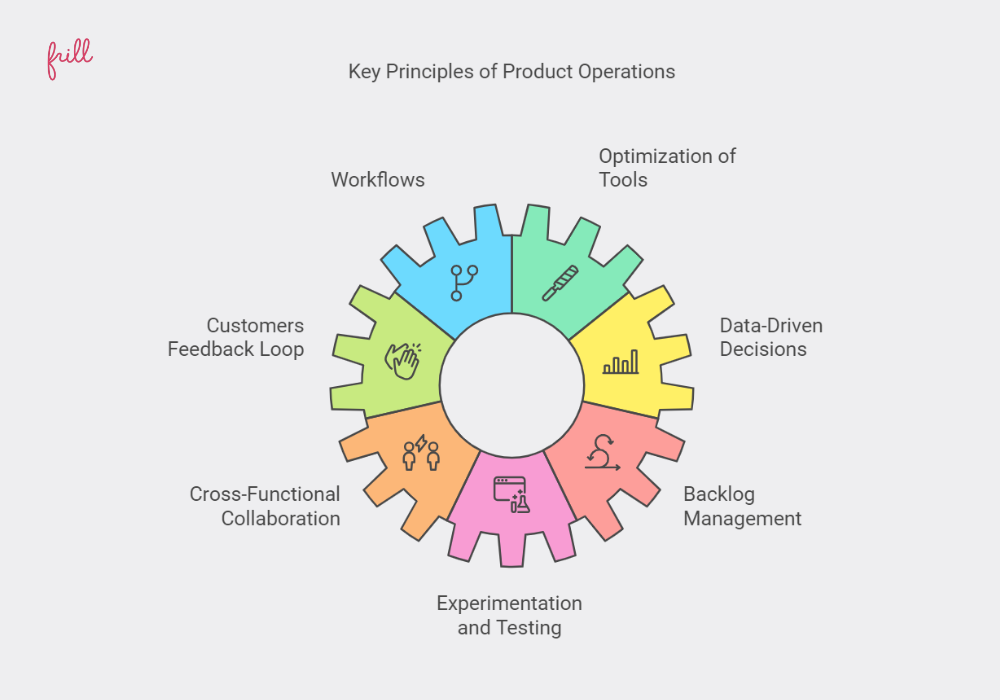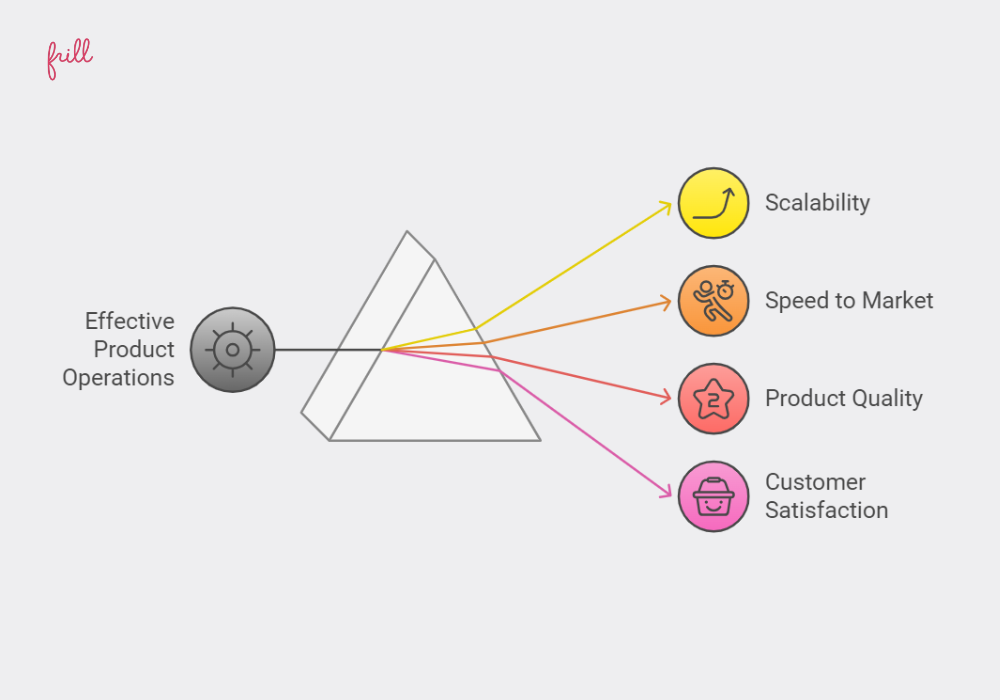Effective Product Operations for Business Growth
Last updated on Wed Nov 27 2024
The seamless execution of a product is vital to achieving a successful product in the ever-evolving landscape of product management and development.
For every successful product, standardized processes are implemented to help improve product production and timely delivery of high-quality products. This is known as product operations or ProdOps.
Product operations are the driving force of product-led growth. It involves optimizing the systems, data, tools, and processes involved in product development. This function helps product teams work efficiently and effectively to deliver value to their customers, thus achieving the organization’s goals.
Let’s look into the details, the principles, and the importance of effective product operations in driving growth in your business.
Key Takeaways:
Efficient product development is important for staying ahead in a competitive market.
The principles of product operations are critical for efficient product management and development.
There are numerous benefits of cohesive product operations.
Incorporating customer feedback improves customer satisfaction
Streamlined operations help to deliver high-quality products on time and boost the organization’s growth.
The 7 Principles of Product Operations

The goal of every business is to deliver high-quality products and satisfy their consumers. To achieve this, below are seven principles that must be followed:
1. Workflows
These are structured processes that product teams follow to manage tasks from idea to execution in an organized way. A properly structured workflow states how tasks would be done. It also designates roles and responsibilities for product teams. This helps product managers and teams stay on track, carry out their work well, and meet deadlines, ensuring timely product delivery.
2. Optimization of Tools
Product development tools are available for product teams in their execution process. However, it is important to choose the right tools to use. The task of choosing the proper tools to ensure a successful product is quite challenging. This is where product operations come in.
Product operations help with the right tools and integrate them into workflows seamlessly. This process makes work easier, faster, and more efficient for product teams.
3. Customer Feedback Loop
To produce user-centric products, collecting and incorporating customers’ feedback into product development is key. You can gather information through customer interviews, surveys, and analytics. The, implement a systematic approach to customer feedback management to enhance decision-making processes.
4. Data-Driven Decisions
Effective collection of data leads to a successful product. Product operations focus on data-driven decisions through customer feedback, market research, and performance metrics. This will help to make better and more informed decisions in solving consumers' problems and increase customer satisfaction.
5. Cross-Functional Collaboration
Product operations involve team communication and collaboration to ensure the product’s success. It involves the collective efforts and inputs from various departments involved in the development of the product. The various departments include product management, marketing, sales, customer support, and so on. They work together to achieve a common goal.
For instance, setting up weekly calls between product managers and support teams can facilitate smooth communication and collaboration. When there are good communication flows across teams and stakeholders, it reduces misunderstandings and keeps everyone aligned with the product’s vision. Explore the 10 expert steps in the product management process.
6. Backlog Management
This is one of the pillars of product operations. The tasks and features that are to be executed by product teams should be clearly stated in the product backlog. It is a to-do list for product teams that guides them to do the right thing at the right time.
Product operations play a significant role in backlog management by creating systems that help organize tasks and features that resonate with consumers.
Learn more about how to create a feature prioritization matrix to streamline your workflow.
7. Experimentation and Testing
In meeting the needs of the customers, experimentation, and testing are crucial. New ideas should be experimented with and rigorously evaluated before implementation in order to determine whether they can solve users’ problems. A/B testing, an experimentation process, can be used to test assumptions and learn from user behavior. This can help to mitigate risks in product development.
The Importance of Effective Product Operations

When the tools, data, systems, and collaboration are effectively optimized, there are a lot of benefits. The importance of cohesive product operations includes:
Scalability and Flexibility
In product development, scaling effectively and not getting overwhelmed can be challenging for product teams. Cohesive product operations create scalable systems that allow teams to grow and ensure product delivery. This function helps to automate repetitive tasks and refine workflows, thus laying the groundwork for long-term success.
Also, this scalability makes it easier to adapt to new challenges, changes in consumer demand, or evolving business priorities. Product operations also introduce flexible tools and systems that can adjust to shifting team sizes, goals, technological advancements, and market conditions. This helps to build products that remain competitive and relevant.
Check out release note templates to ensure clear communication during scaling.
Increased Speed to Market
With the implementation of data-driven insights, well-defined workflows, tool optimization, and systems integration, high-quality products are timely delivered.
Product operations reduce the time it takes to launch the product from the idea phase to execution and get to the market on time.
Enhanced Product Quality
Product operations ensure the delivery of high-quality features and products that increase customer satisfaction. Businesses should strictly follow the principles of ProdOps to achieve successful products. Quality products are enhanced through the creation of systems that enable product teams to work seamlessly.
Improved Customer Satisfaction
The expectations of customers are met when feedback is incorporated and the product is tailored to their needs. This helps to maximize user retention and loyalty.
Conclusion
Efficient and effective product development relies heavily on product operations. This operational function is the heartbeat of every successful product. It empowers product teams to make decisions based on data-driven insights, structured workflows, feedback processes, and enhanced collaboration.
In this evolving market, product operations will continue to be a driving force in ensuring products reach their full potential, benefiting customers and businesses.
FAQs
What Is Product Operations?
Product operations is a function that efficiently streamlines and optimizes workflows, systems, and processes in product development to meet customer needs and drive business success.
What Is the Importance of Product Operations?
Product operations ensure operational efficiency, and scalability, and improve collaboration across teams through feedback and continuous improvements, backlog management, and experimentation.
What Are the Pillars of ProdOps?
The foundations of production operations include workflows, processing user feedback, and integrations.